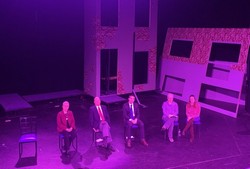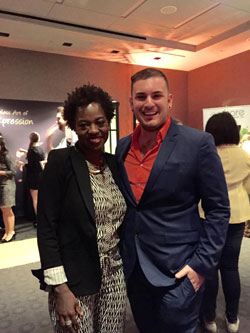The University hosted a documentary play entitled Banished: A Family on the Sex Offender Registry, to discuss issues with the sex offender registry, on Monday, Feb. 9 in Woods Theatre.
Banished is an oral history project, telling the story of harms caused by the sex offender registry. It follows the story of one family through the criminal proceedings and changes they endure while preparing for the registry.
The play also features interviews with Elizabeth Letourneau, Director of the Moore Center for the Prevention of Child Sexual Abuse at Johns Hopkins University; and, Patty Wetterling, a national children’s safety advocate, whose son’s disappearance led to the Jacob Wetterling Crimes Against Children and Sexually Violent Offender Registration Act. The contained works are co-written by Elizabeth Weill-Greenberg, a staff writer for The Appeal, and coLAB Arts producing director, Dan Swern.
The names of the family are altered for confidentiality purposes.
Kiefer Swanson, played by actor David Seamon, pled guilty to indecency with a child in
December of 2015, years after the incident transpired. In a series of interviews, Kiefer and his family provided insight into the aftermath of the sentencing.
Kiefer’s career in the air force was on track, when he received a text from his father that they needed to talk. His father explained that there was an open investigation regarding what happened when he was 11 years old.
To provide context, Kiefer described his exposure to sex at a young age. When Kiefer was five, he was forced by a teenage girl to French kiss while she touched him intimately. Kiefer never talked about his experience.
However, at age 11, Kiefer tucked his four-year-old sister in one night and proceeded to dry hump her. His parents were made aware of the event directly after it transpired by the sister, and Zane Swanson, played by actor Robert Carr, proceeded to beat his son. Kristen Swanson, actor Meridith Grundei, told her son and daughter to never go into each other’s room.
A friend of the sister had reported the incident to the police years later, when Kiefer was home to visit. Meridith and Zane had to speak with the police and were told to keep it secret from Kiefer, which Zane did not because Kiefer is his son.
During the trial, Kiefer’s lawyer admitted to not having looked at his case in over six months and that his best chance was to accept a plea deal and register as a sex offender. He has been discharged from the military.
Meridith said, “I cried every day for four years,” and Zane explained his son can’t come home due to the location of their house. Kiefer has not seen his sister in years despite her their previously close relationship.
Letourneau, played by actor Helen Farmer, said, “Recidivism is low in kids that get caught, and [no studies] predict a future of re-offending,” she continues “[These incidents] are absolutely developmentally appropriate ignorance.”
Child offenders are going through puberty and are not properly educated on who an appropriate sexual partner is. A survey on children ages 12-17 with problem sexual behavior showed that a third were subject to sex offender registration and those children were four times more likely to experience thoughts of suicide, Letourneau said.
The play was followed by a panel moderated by Deanna Shoemaker, Ph.D., Graduate Director of MA in Communication, Associate Professor of Communication and Performance Studies, and Advisor to CommWorks. Panelists included Fletcher Duddy, Deputy Public Defender and Director of the Special Hearings Unit for the NJ Office of the Public Defender; Michael C. Woyce, Assistant Deputy Public Defender, Special Hearings Unit in Asbury Park for the NJ Office of the Public Defender; and, Eleanor Novek, Ph.D., a Professor of Communication at Monmouth University.
Shoemaker said, “I think that students are being exposed to a kind of performance work that requires a lot of extensive research, interviewing of community members—a particular targeted community, and their getting to witness how performance can be a form of social change and even social justice.
The topic is looking critically at the sex offender registry in our larger criminal justice system.”
Duddy explained that community notification and registration of sex offenders was passed federally under Megan’s Law in 1996. The legislation required a public registry and other components of notification. Since then, Duddy’s office has seen some of the consequences the actors discussed.
“Some of the measurable outcomes of the impact of the registration and notification are not just on the sex offenders but on families and the community as a whole… constitutional protections are removed from convicted sex offenders,” Duddy said.
He continued, “[The play is] an amazing snapshot that we all got through this presentation of all of the aspects of impact of these notification and registration systems.”
Currently, a three-tier notification system is in place to determine the risk offenders. The lowest level means law enforcement is informed, and the highest risk means door-to-door notifications and posters. This results in homelessness and joblessness, and the risk assessment system has never been clinically validated, Duddy explained.
Novek, who has volunteered in prisons since 2001, said, “Offenders need supervision but also social support… We’re voting members of the public, one way we can push back is to be educated.”
Brittany Macaluso, a junior social work student, who helped orchestrate the event, said, “As a society we hear a lot about sexual abuse, but we neglect to think of the abuse that the abuser has to go through from registering on a sex offender list. This limits housing options, occupations, and even access to education”
Woyce said of public defenders, “Most of our clients don’t have funds to pay for representation of challenge some of these laws even when it’s being applied to them. So, for a much cheaper rate, we provide them representation that they don’t otherwise have access to.”
Duddy concluded that this system isn’t always what’s best for the victim. “Often, bridges between the offenders and victims need to be built,” he said. “We see this when Kiefer is talking about not being able to see his sister. What if forgiveness is important to her?”
Banished is Co-Sponsored by the New Jersey Office of the Public Defender; NeighborCorps Re-Entry Services; National Religious Campaign Against Torture in New Jersey; Town Clock Community Development Corporation; Brady Project of Middlesex County; and, Anti-Poverty Network of New Jersey.
The special event is co-sponsored by the Monmouth University Center for the Arts; CommWorks; the Department of Criminal Justice; the Department of Political Science and Sociology; the Department of Communication; the Helen McMurray Bennett Endowment for Social Ethics; the MU Honors School; the School of Social Work; and, the NJ Alternatives to Violence Project.
PHOTO TAKEN by Olivia Monahan



